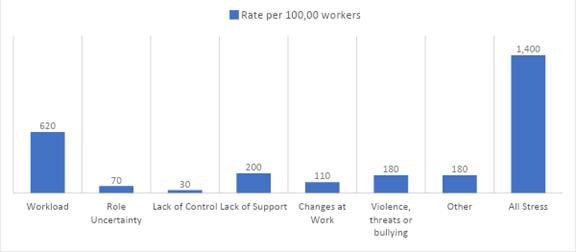Employee health and well-being in the workplace is crucial in cultivating a healthy, constructive and, most importantly, happy workforce.
Experts have noted that mental health-related illnesses can cost companies up to £45 billion a year. Therefore, it is paramount that workplaces receive better support to help manage the general well-being of their employees[i]. We’ve put together a guide of ways to boost the motivation and well-being of employees and help create space that they will be proud to work in.
Why is wellbeing at work important?
Taking care of your employees is not only morally right, but it also ensures an efficient, productive workplace. In addition, the mental health of your employees will impact many other aspects of your business, such as:
- The success rate of the work they complete
- Productivity
- Staff turnover rate
- Number of sick days taken
- Customer service
- Company’s reputation
Good general mental health makes employees at least 12% more productive at work, and 90% of young workers are more likely to stay with a company if it identifies with their needs. [ii] Helping to maintain general mental health and well-being will give your company many benefits in the long term, so pledging to help your employees and boost their welfare is in your best interest.
In recent years, there has been a significant increase in employee absenses, stress, burnout, and overall fatigue due to the state of their wellbeing. In a study by MHFA England, for example, they found that “a quarter (25%) of UK workers report feeling unable to cope with workplace stress, showing the need for more support,” as well as, when discussing burnout – “63% of UK employees now showing symptoms like exhaustion and disengagement, up from 51% two years ago.”
The concerns highlighted by the MHFA England study regarding the mental wellbeing of employees in the workplace are particularly alarming for several reasons:
- Legal and Compliance Risks: There are legal implications to consider. Employers have a duty to ensure the health and safety of their employees. Failing to address mental health issues can lead to legal repercussions if it is found that the workplace has not taken adequate steps to prevent or mitigate these risks.
- Impact on Productivity: Mental health issues like stress and burnout can severely impact employee productivity. Workers experiencing these conditions may have difficulty concentrating, make more mistakes, and be less efficient. This can lead to a decrease in the overall output of a business, affecting its bottom line.
- Employee Turnover: High levels of stress and burnout increase the likelihood of employee turnover. When employees leave, companies incur costs related to recruiting, hiring, and training new staff. Furthermore, the loss of experienced workers can lead to a gap in expertise and continuity within the team.
- Workplace Culture: A rise in mental health issues can create a toxic workplace environment. Stress and burnout can lead to increased conflicts among employees, poor communication, and a general decline in morale. This environment can perpetuate the problem, making it harder for employees to feel motivated and engaged.
- Healthcare Costs: Employees suffering from poor mental health may require medical treatment, which can lead to increased healthcare costs for employers, especially in systems where employers are directly involved in healthcare provisions. Additionally, untreated mental health issues can lead to further physical health problems, compounding these costs.
The UK is experiencing a mental health crisis. Learn more about the state of mental health in the UK here.

How many people struggle with their wellbeing at work?
Mental health issues and workplace stress are responsible for at least 70 million workdays lost each year[iii], making them the leading cause of sickness absence across the U.K. Furthermore, it is estimated that 1 in 6 people of working age will be suffering from mental health issues at any one time[iv].
Self-reported work-related stress, depression, and or anxiety in Great Britain, by age and gender per 100,000 workers averaged over the period 2017/18-2019/20

Above are the number of workers out of 100,000 who reported having symptoms of stress, depression or anxiety in Britain between 2017/18 – 2019/20. As you can see, women are more likely to report mental health issues than men. As many as 3,100 women between the ages of 25-34 self-reported these issues on the whole. In total, 1,740 men and 2,330 women reported stress, anxiety and or depression between these four years.
How self-reported stress, depression or anxiety in Britain was caused or made worse by work, 2009/10 – 2011/12

The key indicator for symptoms of stress, depression and or anxiety in the workplace between 2009/19 – 2011/12 was the workload. Coming in second was the lack of support from management. 60% of employees have said they’d feel more motivated and generally happier if their employer took action to support their well-being [v]. This number shows that alterations in management behaviour and communication are vital to improving employee mental health.
Shockingly, 180 people said that their symptoms were due to violence, threats or bullying in the workplace. Keeping your employees safe and snuffing out any violent behaviour is essential for a healthy space and employee well-being. Overall, 1,400 people claimed that their stress, anxiety or depression was caused by general work stress.

How to maintain wellbeing at work
As you now know, nothing is more important than looking after the well-being of your employees, but it can be hard to figure out where to start. So whether you’re running an office spanning several floors or just a single room, here are some valuable ways to make your workplace a healthy and encouraging one for all your employees.
1) Measure general wellbeing across the company
Begin by tracking absence rates. Any consistent absences in specific sectors should show you where mental health seems to be the worst and give you a place to start. Oddly enough, tracking excessive working hours and unused holiday dates is also an excellent way to measure general well-being. These figures will show you where other problems may be occurring, as these employees could be struggling with the workload. Finally, tracking your company against the industry norms is a great idea to show you how you compare to other similar businesses and show you whether you are ahead or lacking in certain areas.
2) Give regular praise and feedback
Providing your employees with generous praise regularly when they are working well and fair, constructive criticism when they need a bit of a boost will work wonders on their well-being. Acknowledging that your employees are doing well will make them more likely to continue hitting their targets and working well. Constructive criticism given kindly will encourage them to work towards their new goals without resentment or mental health intrusions.
3) Build a positive company culture
Defining a positive culture within the workplace with a clear vision and purpose will make employees aware of their individual contributions to the company. With this in place, they’ll understand their part in the business’s success and take more pride in their work. In addition, maintaining engagement and satisfaction with all the work they do will significantly impact the well-being of your employees.
4) Discuss wellbeing and metnal health – break the taboo
Regularly check-up with your employees and talk to them about how they’re feeling about everything. Ask them how they feel about their workload and in-work relationships and if there’s anything you can do to help them. Checking in with individual employees is best because private conversations are more likely to encourage honest answers, but small groups are just fine for bigger businesses.
5) Encourage a healthy work-life balance
Cultivating an environment that supports a healthy work-life balance will boost employee mental health and well-being overall. For example, encouraging the use of holiday dates, part-time working, working from home, and job shares will be very effective for employees, especially those with families or long daily commutes. In addition, ensure that managers and leaders promote a healthy work-life balance themselves to show employees that, as a business, you support and prioritise a well-balanced approach to business.
6) Open the lines of communication
Public polls have shown that only 13% of employees would be comfortable talking about mental health issues at work[vi], so having open communication is key to encouraging healthier well-being. In addition, allowing yourself to be open, trustworthy and available will lead to honest communication between you and your employees. Update them on changes in the business, check in on them regularly and schedule time to talk if necessary.
7) Introduce employee benefits
Employee benefits that encourage well-being can play a vital role in generally boosting mental health. For example, things like gym memberships, car share schemes and discounts on clothing, restaurants or even everyday shopping can significantly increase mental health and encourage a healthy work-life balance by providing employees with a reason to forget about work temporarily.
8) Enrol on a mental health course
Understanding and trying to help with the mental health of others can be challenging. If you need a bit of a boost yourself, there are plenty of mental health courses out there that you can enrol on. These will help you gain practical knowledge that will assist you in looking after yourself as well as your employees and better equip you to set up a healthy workplace.
We offer a range of mental health courses online that cover a variety of topics. So whether you want to understand mental health and general well-being and how best to nurture it or have a career path in the subject, we have a course that will suit your needs.
For further assistance and tips on looking after your employee’s well-being, have a look at the mental health charity Mind.
Help your employees to maintain their wellbeing
Unfortunately, there is no general outline for businesses to set up its policies for motivation and well-being at work. Each company will have to set up a strategy tailored to the needs of the employees. Their input on this is essential to creating a long-lasting plan because you want to support them. Setting up specific policies or activities and monitoring their effectiveness will show you what works best for your employees and what will benefit your business in the long run.
Remember, to win in the marketplace, you must first win in the workplace. When you begin to maintain your employee’s well-being, mental health and motivation, the boost in your business will be astronomical.
Sources
[i] https://www2.deloitte.com/uk/en/pages/press-releases/articles/poor-mental-health-costs-uk-employers-up-to-pound-45-billion-a-year.html
[ii] https://www.wellingtonplace.co.uk/blog/importance-mental-health-awareness-workplace/
[iii] https://www.mentalhealth.org.uk/our-work/mental-health-workplace
[iv] https://www.blackdoginstitute.org.au/wp-content/uploads/2020/04/black-dog-institute-mental-health-toolkit-2017.pdf
[v] https://www.mind.org.uk/media-a/4662/resource3_howtopromotewellbeingfinal.pdf
[vi] https://www.mypossibleself.com/blog/mental-health-workplace-uk-crisis-eight-statistics/
MHFA England (2024) Key workplace mental health statistics for 2024. [online] Available at: https://mhfaengland.org/mhfa-centre/blog/Key-workplace-mental-health-statistics-for-2024 [accessed 18/03/2025]








